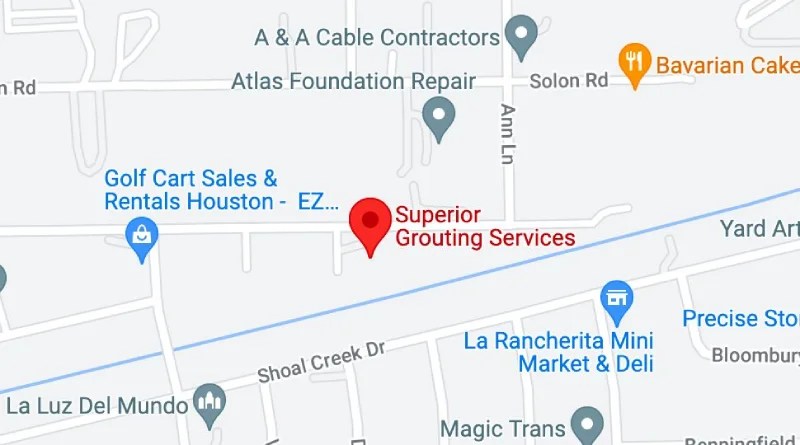What Is Tunnel Grouting in Houston, TX?

Houston’s below-grade energy, water, and transportation corridors face some of the most unpredictable subsurface conditions in the Gulf Coast. Soft alluvium, high groundwater pressure, and unconsolidated sand lenses can threaten the structural integrity of a tunnel liner the moment excavation starts. Tunnel grouting—sometimes called pressure grouting or contact grouting—adds an engineered layer of protection by injecting cement-based or chemical grout into the ground to stabilize weak soil, fill voids, and stop water intrusion before it endangers a project’s schedule.
Key Takeaways
- Tunnel grouting stabilizes soft, water-logged Houston soils by injecting cement or chemical mixtures to reinforce ground strength, seal leaks, and prevent deformation during excavation or boring operations.
- Pressure and contact grouting protect tunnel liners by filling annular space, reducing earth pressure, and sealing water pathways—critical for large-diameter utilities and directional drilling in Gulf Coast conditions.
- Jet and chemical grouting provide advanced groundwater control, using high-pressure or low-viscosity materials to stop seepage in sand seams, soft clays, and fractured zones without disturbing nearby structures.
- Grouting enhances structural safety and reduces dewatering needs, allowing contractors to maintain face pressure, prevent voids, and cut pump discharge volumes in shafts, treatment tunnels, and microtunneling routes.
- Choosing a Houston-based grouting contractor ensures local soil expertise, proper grout mix design, high-pressure injection capabilities, and compliance with City of Houston, TxDOT, and treatment plant specifications.
Grouting: The Backbone of Modern Tunnel Construction
Grouting involves injecting a flowable material into fractures, pores, or annular space along the tunnel until the material sets and forms a solid, low-permeability mass. For Houston contractors, the method is indispensable because it:
- Controls groundwater flow that can flood shafts, microtunneling drives, and directional bores.
- Provides ground support for tunnel boring machines (TBMs) operating in soft ground.
- Creates a uniform interface between the tunnel liner and the surrounding formation, reducing earth pressure that might otherwise deform a large-diameter utility conduit.
- Offers a cost-effective alternative to deep foundations or extensive dewatering programs.
Unlike surface grouting work on open-cut jobs, tunnel grouting is executed within restrained spaces, often hundreds of feet below grade, making precise mix designs, viscosity control, and high-pressure equipment vital.
Why Houston’s Soil Conditions Demand Specialized Grouting Solutions
Houston sits on interbedded layers of silt, fat clay, and loose sand deposited by the Brazos and Trinity Rivers. These ground conditions exhibit high permeability contrasts and significant shrink-swell behavior. When you excavate a tunnel, shaft, or trenchless pipeline route, three primary risks appear:
- Groundwater infiltration from artesian zones.
- Loss of ground around the TBM shield leading to surface settlement and potential damage to existing structures or utilities nearby.
- Chemical attack on concrete from acidic lignite seams and saline water.
Pressure grouting addresses all three. By injecting cement grout, chemical grouts, or a hybrid chemical and cement system, contractors reduce permeability, increase cohesion, and establish an impermeable curtain that keeps water pressure in check.
Core Grouting Methods Used Along the Tunnel Alignment
Heading keywords appear below to help you navigate available techniques:
Cement Grouting
Traditional cementitious mixes with fly ash or slag are pumped at moderate pressure to fill large voids and reinforce weak soil. Cement grouting is used during annular backfill behind segmental linings and for bulkhead construction at shaft interfaces.
Chemical Grouting
Low-viscosity acrylate gels, polyurethane foams, and silicate resins penetrate fine sand seams or hairline cracks. Chemical grouting excels at groundwater control where cement particles are too coarse, providing rapid set times that limit downtime on critical construction projects.
Jet Grouting
Jet grouting uses a high-pressure rotary drill to erode and mix in-situ soil with cement slurry, creating soil-cement columns with predictable strength. Jet grouting delivers ground stabilization beneath treatment plant structures, launch boxes, and areas where directional pipe ramming crosses soft ground.
Contact and Annular Space Grouting
Immediately after the TBM advances, a twin-component grout is injected through tail-shield ports to fill the annular space between the tunnel liner and the excavation. This contact grouting supports the liner, equalizes earth pressure, and blocks water pathways.
Step-By-Step Tunnel Grouting Process
- Geological Investigation: Boreholes, packer tests, and permeability measurements identify weak soil zones, groundwater pressure, and potential voids.
- Mix Design & Pilot Testing: Engineers evaluate cement-based and chemical grout blends for pumpability, set time, and compressive strength.
- Injection Plan: Location, depth, and sequencing of grout holes or packers are modeled to prevent hydraulic fracturing of adjacent soft ground.
- High-Pressure Injection: Grout is pumped via jack-equipped rigs or drill-mounted lances. Flow, volume, and pressure are logged in real time.
- Verification: Post-grout Lugeon tests, CCTV inspections along the tunnel, and ground-penetrating radar confirm target permeability and void elimination.
- Secondary Grouting: If seepage persists, a tighter grid or chemical follow-up is deployed, ensuring long-term groundwater control.
Materials and Mix Designs That Perform in Houston
- Cement grout: Portland cement, micro-fine cement, and fly ash yield a range of grouting viscosities suited for large voids or unconsolidated sand.
- Polyurethane foam: Expands against water flow, seals joints in precast utility tunnels, and remains flexible under minor movement.
- Acrylate gel: Ultra-low viscosity (<3 cP) for permeation through silty sand without raising earth pressure.
- Silicate: Quick gel, minimal exotherm, ideal near sensitive pipelines or existing structures where heat could cause damage.
Each formulation is bench-tested to verify compressive strength, bleed characteristics, and long-term durability in Houston’s aggressive groundwater chemistry.
Applications Beyond the Boring Machine
Shaft Construction: Pre-excavation grouting stiffens the soil column, preventing raveling during deep excavation.
Microtunneling & Trenchless Utility Installations: Grouting systems control groundwater so cutters maintain face pressure and steer accurately.
Wastewater and Treatment Plant Tunnels: Contact grouting seals segment joints, protecting downstream process equipment from seepage and corrosive water.
Pipeline Crossings Under Rail or Highway: Compaction grouting fills voids caused by pipe jacking, preserving overlying pavement integrity.
Benefits of Advanced Grouting Systems
- Ground Stabilization: Increased shear strength in weak soil eliminates the need for costly liners in certain zones.
- Groundwater Control: Reduced permeability mitigates water flow into the tunnel, lowering long-term maintenance.
- Structural Integrity: Cement-based columns and annular fills distribute load uniformly, extending service life of the tunnel liner.
- Schedule Advantage: Targeted injection can often replace large-scale dewatering, accelerating excavation and backfill operations.
- Environmental Stewardship: Controlled injections limit spoils, reduce dewatering discharge, and lower the carbon footprint compared to deep foundations.
Choosing the Right Grouting Contractor in Houston
A successful program hinges on an experienced grouting contractor that understands local ground conditions and the range of grouting options available.
Ask about:
- TBM, microtunneling, and large-diameter shaft experience in soft ground.
- In-house lab capabilities for custom cement and chemical grout mix designs.
- High-pressure pumps rated for jet grouting and permeation work.
- QA/QC protocols, including data logging, earth pressure monitoring, and groundwater sampling.
- Familiarity with City of Houston, Harris County, and TxDOT specifications.
Superior Grouting’s portfolio spans utility tunnels, water and sewer interceptors, and critical shaft work where dewatering alone could not control groundwater. When you select a contractor with proven grouting services, you gain predictable performance and avoid costly re-work.
Conclusion
Grouting is used across Houston’s tunnel excavation landscape to stabilize soil, seal water pathways, and maintain safe, efficient progress. Whether you need annular contact grouting behind a TBM, jet-grouting columns under a launch shaft, or low-viscosity chemical grout to stop seepage at a treatment plant, the right grouting solutions protect budgets, schedules, and infrastructure.
Partner with a grouting contractor who brings advanced grouting systems, rigorous data collection, and local geologic knowledge, and you’ll deliver construction projects that stand up to Houston’s demanding subsurface challenges.


